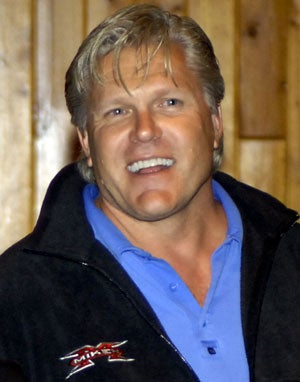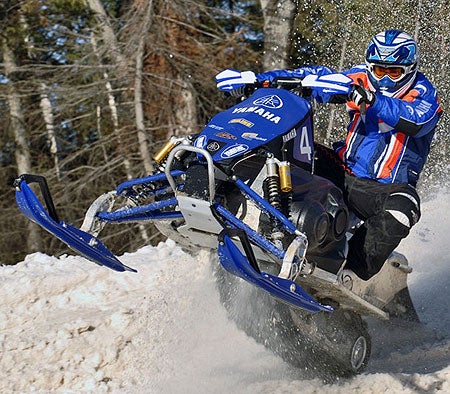John Daniels and the return of ISOC

Can this former racer with a television background salvage snocross?
When John Daniels sold the International Series of Champions (ISOC) cross-country snowmobile race series in the mid 1990s, he didn’t imagine that it would land back in his lap.
Daniels, 52, a former snowmobile racer, may have strayed from the business end of snowmobile competition, but his passion for the sport never died. So when the World PowerSports Association (WPSA) circuit folded this past spring, Daniels was in the wings with a plan.
He presented his proposal for a new snocross series with an old name: ISOC. He ran numbers for an eight-race series, offered interesting promotion ideas and, the kicker, offered a solid plan for television exposure. His package was agreed-upon by snowmobile manufacturers and the new ISOC crew has not had a break all summer.
ISOC director of operations Scott Lorentz spent the last two weeks of August filtering through racer registrations. Assets have been purchased — and moved — from WPSA. Communities have contacted ISOC, and the series may add more events. Additional staff has been hired, including some former WPSA employees. An advisory board has been formed. Regional affiliates are falling into place.

The workload is heavy and anticipation is high for the re-born ISOC. Daniels is ready.
From Racer To Owner
Daniels, who’d raced snowmobiles since he was 12, organized his first race in Albertville, Minn., in 1991. It was a non-sanctioned, one-time event, but Daniels pulled together a $5,000 purse. It was big money for a sport that was lucky to have a $1,000 purse.
That spring he was contacted by other communities, which wanted him to organize similar events. He sensed a business opportunity and put together a series. Each race had the $5,000 added purse. In four years he had a 12-race series.
 John Daniels hopes to give snowmobile racing “…a shot in the arm.” (Wayne Davis Photo)
John Daniels hopes to give snowmobile racing “…a shot in the arm.” (Wayne Davis Photo)
ISOC was a side-venture to his day job as owner of Long Haul Trucking, based in Albertville, and by 1995 the two businesses were too much for himself and his small staff. The trucking business had taken off — he had 11 trucks at the start of ISOC and was up to 80 when he sold. He’d lost a chunk of money when a television production company he’d hired to film the races went bankrupt, which helped solidify the decision to sell. He found someone he thought would continue to build ISOC and sold the series. He was dismayed when, within a couple of years, the series was bankrupt.
Daniels then turned his attention to another interest: slow-pitch softball. He sponsored a national championship team, formed a high-caliber A league and eventually started a softball television series. He started off with a contract film crew, but eventually brought the whole production function in-house.
In 2005, he came back to the snowmobile business, albeit the recreational side, with the production of SledHead 24/7, a television program. The program covered some racing, but was geared more to the trail rider. It was also a way to use his production crew year-round and leverage his airtime purchases.
This put his foot back in the door enough that his racing friends started asking for a new circuit.
“People were telling me horror stories, and asking me if I would do something,” says Daniels.
In the 2007-08 season, he sponsored a Triple Crown series for United States Cross-County, which had a $100,000 purse. Then came the rumors that WPSA was on the brink of failure, and Daniels put together his plan.
Daniels says he brings more to the table than just business acumen.
“As a racer, I know how I would like to be treated,” he says. “The racers are our customers. They’re the ones putting on the show. These racers are the best riders in the sport and the pro racers need to be treated like the professional athletes that they are. The exposure that they get needs to parallel that.”
The new ISOC series has eight national-level races on its current schedule. Some are traditional snocross locations, such as Duluth, Minn. (Nov. 28-30); Shakopee, Minn. (Jan. 9-11); and Valcourt, Que. (Feb. 6-8). Daniels is in negotiations to expand the race schedule, which could include an event in conjunction with the St. Paul Winter Carnival in Minnesota. It would be an historic return of snowmobiling at the carnival, which for many years concluded the I-500 — a finish line that Daniels crossed as a racer.
Timing
It doesn’t take a savvy businessperson to notice the snowmobile market is in tough shape. That certainly hasn’t escaped Daniels, but he thinks he has a strategy that will work.
“There’s only so much money to go around in this industry,” says Daniels. “But I think we have the best vehicle and the best pricing. I could be nuts, but I have a lot of passion for this sport.”
 Yamaha used snocross racing and its factory-backed race team to help develop its 4-stroke Nytro XTX for big bump riders. (Yamaha Photo)
Yamaha used snocross racing and its factory-backed race team to help develop its 4-stroke Nytro XTX for big bump riders. (Yamaha Photo)Television coverage, a deal maker or breaker for the big-name snocross sponsors, is already set up. Daniels already has the infrastructure, and the 10 to 12 race shows he’s planning to produce will segue nicely into the SledHead 24/7 series. It also means better rates on airtime, as he can now buy a weekly slot for the year. Those two factors are an enormous cost-savings over hiring out crews for a limited season, he says.
With television costs controlled, Daniels can also control transportation costs (he’s up to 250 trucks now). He has Andy Groebner, who’s a full-time marketing director, to drum up promotional ideas. Some of the more creative ideas include marketing via a children’s coloring book (which includes free tickets to a race), reduced ticket prices (“I would rather have 20,000 people at $20 per ticket than 10,000 at $45”), and co-promotions with local businesses (such as free pit passes at Subway). Daniels isn’t daunted: “I put 18,000 people on a lake in Albertville with an advertising budget of $3,500,” he says.
“I’m not doing this to get rich,” says Daniels. “I love racing, I love the sport. I love to do something for the sport. I just think that this sport needs a shot in the arm.”
Related Reading: New snocross series in the works








 Your Privacy Choices
Your Privacy Choices